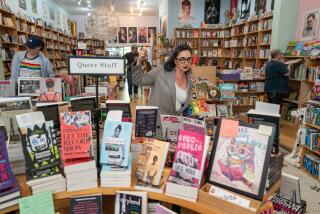State’s 1st Muslim Library Reopens in Canoga Park : Religion: Facility doubles its space and adds more materials. Founder seeks to help non-Muslims become acquainted with his faith.
As Muslims throughout the world prepare to observe the month of Ramadan with fasting and introspection, California’s first Islamic lending library has reopened in Canoga Park after doubling its modest space and adding to its collection of more than 2,000 books, magazines and videotapes.
The Muslim Public Library is expected to aid Muslim families in devotional studies and adjusting to U.S. culture. But it also has an added goal of acquainting non-Muslims with a religion that some view with suspicion because of terrorist acts committed in the name of Islam and because of what Muslims say is frequently distorted news coverage.
To encourage non-Muslim use of the privately run library, founder-chairman Khaled Ahmed Soliman leased a site away from a mosque and offers classes in subjects such as Arabic and self-defense for children.
Islamic books and journals fill several sections, but shelves labeled American history and comparative religion are also stocked. Children’s books are plentiful. “We wanted children to come and when they come, they bring their parents,” Soliman said.
The Muslim Public Library opened in October with only 500 volumes, said Soliman, a systems analyst for Los Angeles’ Community Redevelopment Agency. About $8,000 had been contributed to open and run the library during its early months, he said.
In its first three months, use by non-Muslims has been light, Soliman said. Visitors have included a teacher who borrowed videotapes to use in the classroom and a UCLA student who checked out books on Islam for a report.
Soliman said the library is designed to acquaint people with Islam but not to win new adherents to the religion. “As Muslims, it is not our duty to convert people,” he said, citing an admonition in Islamic scriptures: “Let there be no compulsion in religion.”
*
The library reopened Saturday, after being closed for two weeks to expand into a vacant office next door. The 1,600-square-foot library has room for reading and classes. The project has drawn praise from Southern California Muslim leaders, who say it is the first Muslim lending library in the state, if not the only one in the country.
“Libraries have been an integral part of Islamic civilization throughout history,” said Dr. Maher Hathout, official spokesman for the Islamic Center of Southern California in Los Angeles.
“To see Muslims in America making knowledge available to everybody is an encouraging sign of a positive contribution to U.S. society,” he said. Hathout, a Pasadena physician, is also the newly elected president of the multi-faith Southern California Interreligious Council.
During Ramadan, which begins Thursday, Muslims are encouraged to read or recite the entire Koran, or Quran, which Islam says was revealed by God to the Prophet Mohammed, and to fast during the day.
The fasting period of a lunar month begins after the sighting of the first sliver of the new moon, which astronomical charts indicate will be visible tonight, Muslims say.
Most adult Muslims abstain from food, drink and sensual pleasure from dawn to sunset during Ramadan, an observance that is one of the five pillars of Islamic practice.
*
The period is a very spiritual time, as well as a highly social time, as families exchange visits and attend mosques in the evenings. The Ramadan fasting period ends with a communal prayer and a three-day holiday, Eid al-Fitr.
Discipline, self-restraint and generosity are among the virtues focused on during Ramadan, according to a representative of the Council on American-Islamic Relations based in Washington.
During Ramadan, the Muslim library will have sunset meals, called iftars, every Tuesday for the 19 children now enrolled in classes and their parents. At the official sunset hour, everyone will break the fast for that day with milk, water and sweets such as dates, followed by prayer, a meal and small gifts for the children.
“We are limiting our Ramadan observance to Tuesdays because during that month, everyone goes to the mosque,” Soliman said.
The lending library is one of many projects that the Egyptian-born Soliman, 43, has backed. He taught computer sciences at American University in Cairo before immigrating to the United States in 1982.
He founded the Muslim Public Library last year under the aegis of the Islamic Schooling Foundation, which he said wants to launch a Muslim-run high school in two years.
More to Read
Sign up for Essential California
The most important California stories and recommendations in your inbox every morning.
You may occasionally receive promotional content from the Los Angeles Times.










